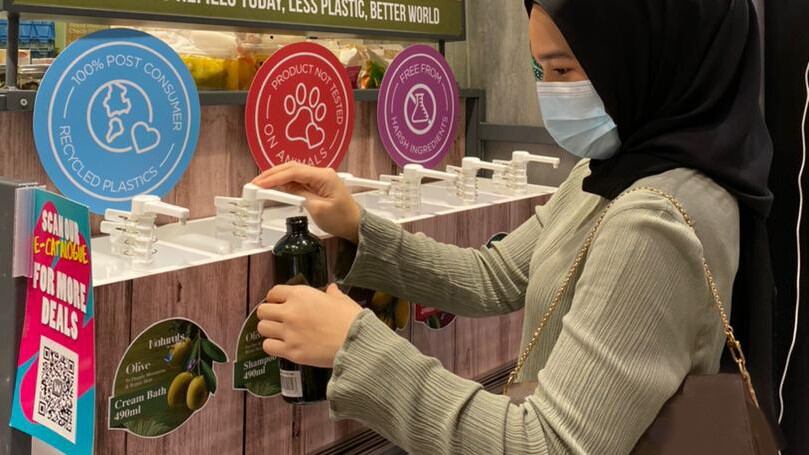As part of its company’s sustainability initiatives, Watsons launched the first Naturals by Watsons refill station in Kuala Lumpur in February to reduce the overall impact of its plastic use.
The station, located in Sunway Pyramid, offers six eco-refills for bestselling products from its house brand. According to the firm, the eco-refills use up to 58% less plastic than a regular bottle.
The launch was in line with the company’s target to offset 2,250 tonnes of carbon dioxide (CO2) emissions. Additionally, the initiative honours Watsons’ support of ClimatePartner’s Forest Protection and Clean Ocean initiatives.
“With an extensive network of over 8,000 physical and online stores in 14 Asian and European markets, Watsons feels it’s our responsibility to drive a change and build a better world with our customers, so sustainability has been at the heart of our strategy,” said Malina Ngai, CEO of A.S. Watson, Asia and Europe.
She noted that because consumers were so used to “grab-and-go” shopping, retailers and brands like Watsons faced a challenge trying to drive a positive change in customer behaviour.
“We’ve put much effort in encouraging customers to clean the used bottle and bring it back for refill, helping them save more while at the same time doing good for the planet… To help make refilling a new everyday habit for customers, we’ve also launched refill packs besides refill stations to encourage them to do good for our planet with us.”
To drive the point home, the company is placing emphasis on education to guide shoppers towards a more sustainable lifestyle.
“Continuous sustainability education is just as important in inspiring customers’ behavioural change. Good Academy that we’re running every Monday is to raise customers’ awareness on sustainability and let them know a small change will make a great impact to our planet.”
Ready to roll
Ngai told CosmeticsDesign-Asia that the feedback it has received in Malaysia so far has been optimistic.
“As our customers in Malaysia are increasingly aware of the sustainability issues, the customers’ responses have been very positive so far. We will keep reviewing the customers’ feedback and continue to enhance the experience,” said Ngai.
The response is driving the company to explore plans to extend the launch of the refill stations in other markets besides Malaysia and Hong Kong.
“We’re ready to roll out the refill station in more markets but it really depends on the customer demand and the local requirements. After launching the first refill station in Malaysia, we’re planning to introduce it in two or three more stores in Malaysia this year. We’re also exploring the possibilities in Singapore and Turkey,” said Ngai.
She highlighted that rolling out refill stations cames with a host of challenges to consider, including floorspace.
“Store space allocation is another challenge as refill stations require a decent space to give customers an easy and hassle-free experience, which reflects our commitment on sustainability to provide better options to customers.”




